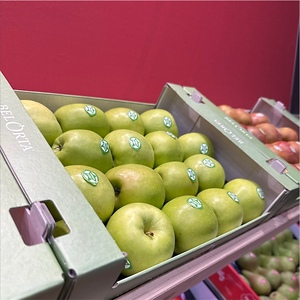


Greenstar® Apples
Estimated Inventory, lb : 0
Description/Taste
Greenstar® apples are a medium to large varietal, averaging 7 to 9 centimeters in diameter, and have a uniform, round to conical shape. The apple’s skin is thin, smooth, matte, and bright green, sometimes showcasing faint white lenticels. Underneath the surface, the flesh is white, tinged with green, and has a dense, firm, and aqueous consistency with a crisp and crunchy texture. The flesh remains white, even after slicing, and encases a small central core filled with tiny black-brown seeds. Greenstar® apples emit a light and delicate scent and have a sweet, subtly tangy flavor. The flesh contains high sugar content, ranging from 12 to 15 Brix, and has some acidity, creating a relatively balanced, sweet, mildly tart flavor profile.
Seasons/Availability
Greenstar® apples are available in the fall through winter.
Current Facts
Greenstar® apples, botanically classified as Malus domestica, are a sweet green apple variety belonging to the Rosaceae family. The variety was developed in Belgium in the late 20th century and was selected as a new commercial cultivar for its sweet flavor, crisp texture, and non-oxidizing flesh. Greenstar® apples are also known as Nicogreen apples and are famous for retaining their bright white coloring for several hours after slicing. The lack of oxidation is due to their high vitamin C content, and the apples are easily transportable, able to be packed in lunches and bags without bruising. After their release, Greenstar® apples saw commercial success in England, being one of the only green apple varieties to thrive in the British climate. The apples were also introduced to Australia and the United States as a specialty cultivar and are sold on a limited scale in select markets.
Nutritional Value
Greenstar® apples are exceptionally high in vitamin C, containing up to three times as much as other apple varieties. This allows the flesh to remain white, even after slicing, as vitamin C acts as an antioxidant to protect the surface, preventing oxidation. The apples are also a source of fiber to regulate the digestive tract, potassium to balance fluid levels within the body and contain lower amounts of vitamins A, E, and K, boron, calcium, zinc, copper, and iron.
Applications
Greenstar® apples have a sweet, subtly tart flavor reserved for fresh preparations. The apples can be consumed straight, out of hand, or chopped into salads, slaws, fruit bowls, and salsas. Greenstar® apples exhibit little to no oxidation when sliced, allowing the fruits to remain white for extended periods. This characteristic makes the apples favored for cheese and fruit platters, fruit appetizer skewers, or for slicing and packing into work lunches, picnics, and children’s meals. In addition to consuming the apples in larger slices, Greenstar® apples can be blended into smoothies, layered onto deli sandwiches, grilled cheese, or paninis, or utilized as a fresh topping over breakfast dishes including oatmeal, waffles, and pancakes. The apples can also be incorporated into raw apple crumbles or dipped in chocolate, caramel, or nut butter as a snack. Greenstar® apples pair well with other fruits such as bananas, strawberries, pineapple, and citrus, cucumbers, leafy greens, nuts including pecans, walnuts, and pine, and cheeses such as gorgonzola, blue, goat, feta, and brie. Whole, unwashed Greenstar® apples will keep for several weeks when stored in the refrigerator’s crisper drawer. The apples are known for having a long shelf life and are favored for their crisp consistency.
Ethnic/Cultural Info
Greenstar® apples were introduced into Australia in the early 21st century as the country’s only sweet green apple variety. The apples are managed by the Greenstar and Kanzi Marketing Group of Australia, a partnership between growers throughout apple production regions, and the group also collaborates with Giston Consulting Services, a company that selects the new apple varieties that will be introduced into the country. Greenstar® apples were chosen as a commercial cultivar for their lack of oxidization and sweet taste. The most challenging aspect of marketing the green variety is its similarity in appearance to the famous granny smith apple. Both apples exhibit a smooth, green surface, but unlike granny smiths that have a sour, tart flavor, Greenstar® apples are sweeter and have a high vitamin C content, preventing the surface from browning when exposed to the air. Most apple varieties contain vitamin C within their skin, but Greenstar® apples hold their vitamin C content within their flesh, preventing oxidation. This has been one of the unique selling points to encourage consumers to try the new variety. Greenstar® apples are also promoted as a favorite lunchbox fruit and a specialty, limited edition variety, lasting only six weeks in commercial markets before selling out for the season.
Geography/History
Greenstar® apples were developed in the late 20th century by nurseryman Johan Nicolai in partnership with Better 3 Fruits, a breeding company in Belgium. The variety was naturally created from the cross-pollination of granny smith apples and delbarestival apples, also known as delcorf apples, and it took over ten years to research, study, and test the apples. Greenstar® apples were released in European commercial markets in 2002 and were patented in the United States in 2006 under the patent number USPP 16559. Since 2004, the variety has been marketed by the European Fruit Cooperation, or EFC, a cooperative of 1,600 fruit growers, and the group also promotes other specialty apples, including Kanzi® apples. Greenstar® apples were later planted in select orchards in Australia in 2012, and the apples quickly achieved commercial success as a premium variety. Today Greenstar® apples are found through growers in Europe, North America, and Australia and are sold through local markets, farm stands, grocers, and distributors.
Recipe Ideas
Recipes that include Greenstar® Apples. One
| Chew Town |
|
Potato Rosti with Greenstar Apple and Fennel Slaw |








